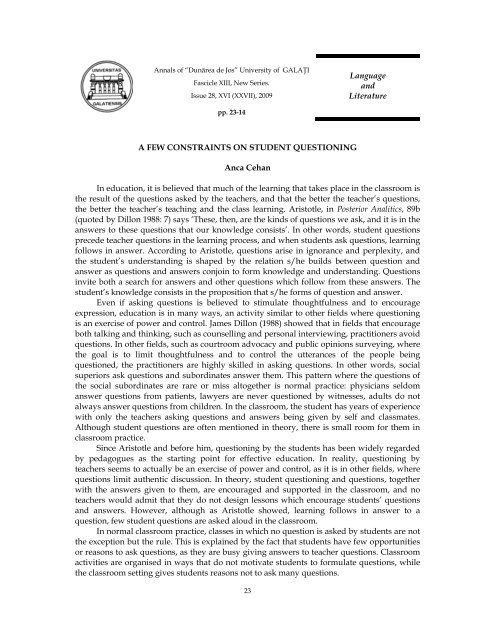Create successful ePaper yourself
Turn your PDF publications into a flip-book with our unique Google optimized e-Paper software.
Annals of “Dunărea <strong>de</strong> <strong>Jos</strong>” University of GALAŢI<br />
Fascicle XIII, New Series.<br />
Issue 28, XVI (XXVII), 2009<br />
pp. 23-14<br />
A FEW CONSTRAINTS ON STUDENT QUESTIONING<br />
Anca Cehan<br />
23<br />
Language<br />
and<br />
Literature<br />
In education, it is believed that much of the learning that takes place in the classroom is<br />
the result of the questions asked by the teachers, and that the better the teacher’s questions,<br />
the better the teacher’s teaching and the class learning. Aristotle, in Posterior Analitics, 89b<br />
(quoted by Dillon 1988: 7) says ‘These, then, are the kinds of questions we ask, and it is in the<br />
answers to these questions that our knowledge consists’. In other words, stu<strong>de</strong>nt questions<br />
prece<strong>de</strong> teacher questions in the learning process, and when stu<strong>de</strong>nts ask questions, learning<br />
follows in answer. According to Aristotle, questions arise in ignorance and perplexity, and<br />
the stu<strong>de</strong>nt’s un<strong>de</strong>rstanding is shaped by the relation s/he builds between question and<br />
answer as questions and answers conjoin to form knowledge and un<strong>de</strong>rstanding. Questions<br />
invite both a search for answers and other questions which follow from these answers. The<br />
stu<strong>de</strong>nt’s knowledge consists in the proposition that s/he forms of question and answer.<br />
Even if asking questions is believed to stimulate thoughtfulness and to encourage<br />
expression, education is in many ways, an activity similar to other fields where questioning<br />
is an exercise of power and control. James Dillon (1988) showed that in fields that encourage<br />
both talking and thinking, such as counselling and personal interviewing, practitioners avoid<br />
questions. In other fields, such as courtroom advocacy and public opinions surveying, where<br />
the goal is to limit thoughtfulness and to control the utterances of the people being<br />
questioned, the practitioners are highly skilled in asking questions. In other words, social<br />
superiors ask questions and subordinates answer them. This pattern where the questions of<br />
the social subordinates are rare or miss altogether is normal practice: physicians seldom<br />
answer questions from patients, lawyers are never questioned by witnesses, adults do not<br />
always answer questions from children. In the classroom, the stu<strong>de</strong>nt has years of experience<br />
with only the teachers asking questions and answers being given by self and classmates.<br />
Although stu<strong>de</strong>nt questions are often mentioned in theory, there is small room for them in<br />
classroom practice.<br />
Since Aristotle and before him, questioning by the stu<strong>de</strong>nts has been wi<strong>de</strong>ly regar<strong>de</strong>d<br />
by pedagogues as the starting point for effective education. In reality, questioning by<br />
teachers seems to actually be an exercise of power and control, as it is in other fields, where<br />
questions limit authentic discussion. In theory, stu<strong>de</strong>nt questioning and questions, together<br />
with the answers given to them, are encouraged and supported in the classroom, and no<br />
teachers would admit that they do not <strong>de</strong>sign lessons which encourage stu<strong>de</strong>nts’ questions<br />
and answers. However, although as Aristotle showed, learning follows in answer to a<br />
question, few stu<strong>de</strong>nt questions are asked aloud in the classroom.<br />
In normal classroom practice, classes in which no question is asked by stu<strong>de</strong>nts are not<br />
the exception but the rule. This is explained by the fact that stu<strong>de</strong>nts have few opportunities<br />
or reasons to ask questions, as they are busy giving answers to teacher questions. Classroom<br />
activities are organised in ways that do not motivate stu<strong>de</strong>nts to formulate questions, while<br />
the classroom setting gives stu<strong>de</strong>nts reasons not to ask many questions.












